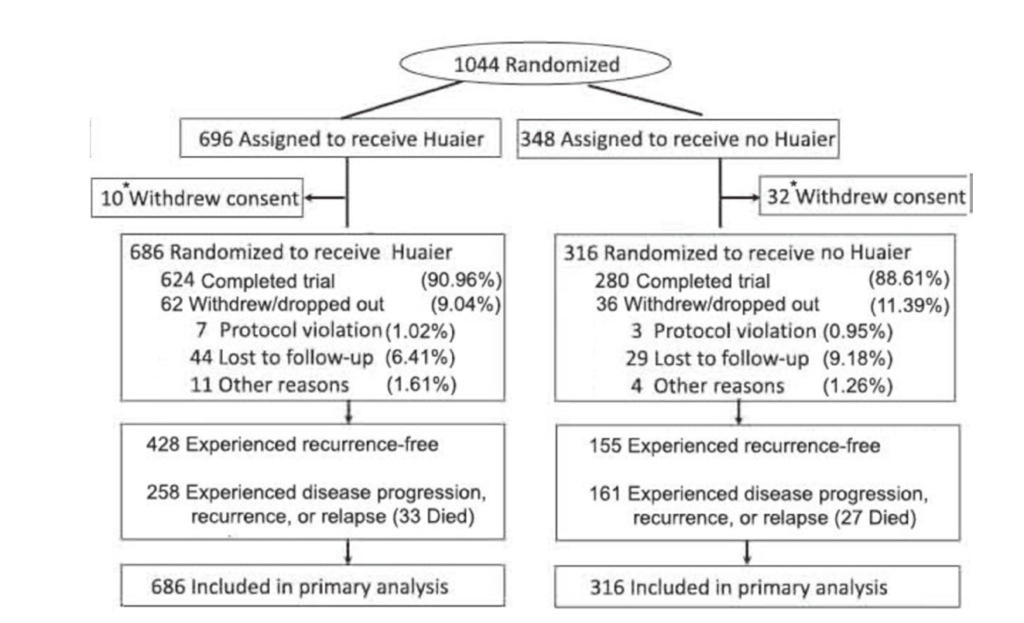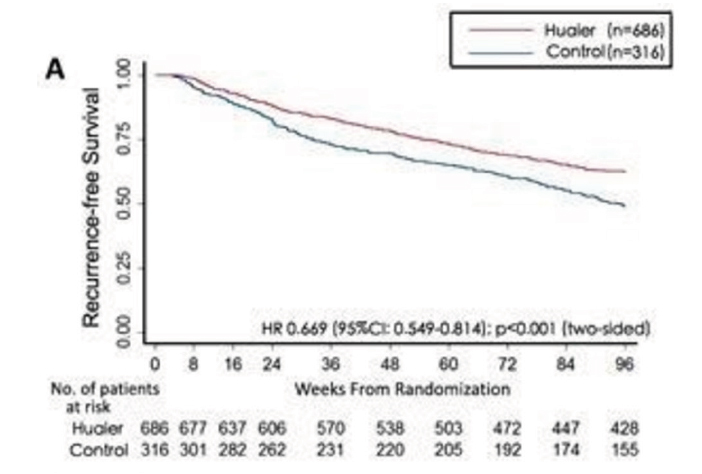英国の権威ある医学誌GUTにフアイアの肝臓癌に対する効果が発表されました
2018年英文医学雑誌GUTにフアイアの抗がん作用に関する臨床研究が掲載されました。「Effect of Huaier granule on recurrence after curative resection of HCC: a multicentre, randomised clinical trial(肝細胞癌根治切除後の再発に対するフアイア顆粒の効果:多施設ランダム化臨床試験)」
最初は二重盲検臨床研究で登録されました。しかし、実薬とは鑑別不能な偽薬が当時は作くれなかったので、ランダム化臨床研究になっています。その概要は、39施設での根治手術後の肝臓癌1044例に対して、フアイアを飲んだ群686例と飲まない群316例を比べました(脱落例があるので足し算が合いません)。再発なし生存を第一の評価項目に、生存率を第二の評価項目にしての解析です。
96週後までの無再発率はフアイア投与群で62.39%、一方非投与群では49.05%となり、明らかな有意差を認めました。また、96週後の生存率はフアイア投与群で95.19%、非投与群で91.46%とこちらでも明らかな有意差を認めました。96週までの肝臓外での腫瘍再発率は、フアイア投与群で8.60%、非投与群で13.61%でした。実薬群ではフアイア20グラムを毎日3回飲ませました。


96週までの生存率・赤線がフアイア
GUTに掲載された研究発表PDFファイルはこちらからご覧いただけます。
英文雑誌GUTの編集長Emad El-Omar教授の特別寄稿の和訳
GUTの編集長が中国医師報に特別寄稿しています。以下に全文を和訳して掲載します。
肝細胞癌は世界的な殺人者であり、特に中国で数百万人の命を奪う。がん治療の進歩にもかかわらず、依然として大きな障壁がある。潜在的治癒手術はある程度の希望をもたらすが、早期再発は患者の70%の命を奪う。潜在的治癒手術後のアジュバント化学療法は残念な結果である。代わりの治療が緊急に必要とされていており、他の癌で用いられている伝統的な治療法にいくつかの回答を求めるべきことは理に適っている。 伝統的中医学(TCM)ではフアイアはよく知られており、また十分に研究されている。フアイアは早期の光明は示したが、最初の研究は小集団で観察期間は短かった。Chenらによる最近の研究が私の医学雑誌Gutに掲載された理由は、この研究が最大の多施設、無作為、二群間の第IV相臨床試験であることだ。それは臨床的に重要な利点を示し、これは中国だけでなく、肝臓癌の世界的な分野で歓迎されるだろう。
この研究が非常に徹底したピアレビュープロセスを受けたことが重要である。 5人の国際的な専門家がこの論文をレビューし、全員がレビュープロセスの終了時にすべて満足しており、必要な改訂後に、この研究がGutに掲載されるに値することを示している。発見されたものが本物で関連性のあるものでなければ、このような厳しいレビューを受けるとほとんどの論文は生き残ることができない。したがって、このレビューを通過したこの原稿をGutに受け入れることを私たちは歓迎した。
Gutの編集長として、私はこの原稿が私の雑誌で受け入れられていることを個人的に非常に喜ばしく思った。最も厳しい研究方法論を遵守している限り、私たちは偏見なく、私たちの専門分野における科学的進歩に貢献することを誇りに思う。伝統的中医学(TCM)には多くのものがあり、中国での厳格かつ十分に管理された臨床試験の出現により、世界は中国の医師とその伝統的な実践の知恵と卓越性から恩恵を受けるだろう。
中国の同僚たちが世界と共有している驚くべき進歩と発見に敬意を評したいと思う。 Gutの編集長(2010年以降)の任期中、私は中国の科学と医学の大きな変革を目撃した。私は、中国がGUTにアクセプトされた論文の最高の寄稿者の1つであることを誇りに思う。長年にわたって中国の同僚を訪れる時間と労力を鑑み、私は本当に友人である彼らに敬意を表し祝福する。
Professor Emad M El-Omar
Editor in Chief, Gut
上記特別寄稿の原文
“Commentary by Prof. Emad El-Omar, Editor in Chief, Gut
“Hepatocellular carcinoma is a global killer, which claims the lives of millions especially in China. Despite major advances in understanding the cancer and some progress in its treatment, it remains a major burden. Potentially curative surgery offers some hope, but early recurrence claims the lives of 70% of patients. Adjuvant chemotherapy following potentially curative surgery has been disappointing. Alternative therapies are urgently needed, and it is very appropriate that we should seek some answers from traditional therapies that have worked in other cancers. Huaier, a well-known and much studied Traditional Chinese Medicine (TCM), offered some early promise but the initial studies were small and short on follow up. This is why the recent study by Chen et al, which was published in my Journal Gut, was very important and very welcome. To date, this study is the largest multicentre, randomised, parallel-group controlled, phase IV clinical trial on this subject. It showed a small but clinically important benefit, and this will be welcomed in the global field of liver cancer, not just in China.
It is important to explain to your audience that this study underwent a very thorough peer review process. Five international experts reviewed this manuscript, and all were satisfied at the end of the review process, and after the required revisions, that the work is worthy of publication in Gut. Very few papers would survive such rigorous assessment unless the findings are genuine and relevant. We were therefore delighted to accept this manuscript for publication in Gut.
As the Editor in Chief of Gut, I was personally very pleased to see this manuscript accepted in my journal. We pride ourselves on being open minded and willing to consider any scientific advances in our specialty, as long as they adhere to the strictest research methodology. TCM has a lot to offer, and with the advent of rigorous and well controlled clinical trials in China, the world will benefit from wisdom and excellence of Chinese doctors and their traditional practice.
I want to congratulate my Chinese colleagues for their amazing advances and discoveries that they now share with the world. During my tenure as Editor in Chief of Gut (since 2010), I have witnessed a major transformation in Chinese science and medicine. I am proud to say that China is one of the top contributors to accepted manuscripts in Gut. Having invested time and effort and many trips to visit my Chinese colleagues over the years, I am truly honoured and blessed to be your friend.”
Professor Emad M El-Omar
Professor of Medicine
Editor in Chief, Gut
Director, Microbiome Research Centre
St George and Sutherland Clinical School
University of New South Wales
Level 2 Clinical Sciences (WR Pitney) Building
St George Hospital
Short Street, Kogarah
Sydney, NSW 2217
